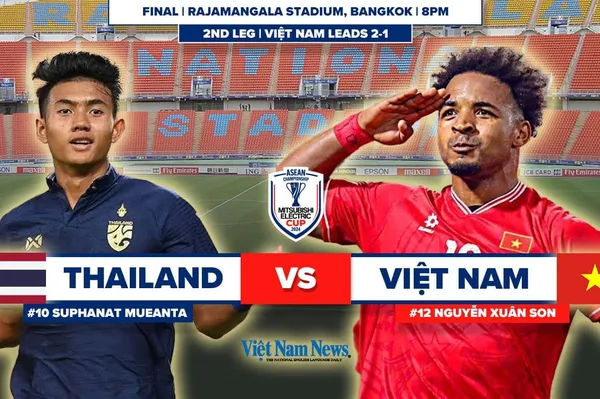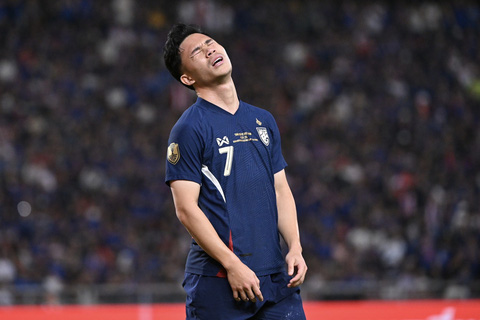 Sports
Sports

 |
| Supachok Sarachat's disappointment during the final against Việt Nam. His tainted goal in the 64th minute was the match's pivotal moment, but not in the way Thailand wanted. — Photo thethaovanhoa.vn |
Anh Đức
Last Sunday, Việt Nam won the 2024 ASEAN Championship in what could be the greatest final in the tournament's history.
But everything about that match could have been so different had it not been for a goal that was talked about for days after the game ended.
With two-thirds of the match gone, a failed corner by Vũ Văn Thanh led to a counter-attack for Thailand. The attack ended as Nguyễn Đình Triệu caught the ball at the very edge of the penalty area.
Thai attackers claimed the keeper handle outside the box, but replays showed that Triệu did not commit a foul. As his captain Nguyễn Hoàng Đức lay down on the ground for a knock and medical officers had to come in, Triệu threw the ball out of play.
As play resumed, the ball was thrown to Ben Davis, who passed to Supachok Sarachat to fire a screamer toward Triệu's top corner, giving Thailand the equaliser on aggregate.
The Vietnamese defenders were at first confused, then protested heavily. The play then stopped for fifteen minutes as both teams argued against each other, and the referee sought to diffuse the situation.
Assuming that you are a reader who does not have a full knowledge of football rules and norms, there are two things that should be explained here.
First, Supachok's goal was legal. There are no current rules in football's Laws of the Game that can deny that. But if the goal is legal, then why are the Vietnamese players protesting?
The reason is that it is normal and a fair-play move in football that whenever a team (Team A) that had possession of the ball actively puts the ball into touch for a medical-related reason for a necessary stoppage in play, their opponent (Team B) must return possession after the throw-in to Team A.
Should the ball be thrown into the goal, the goal will not count, but if the ball is thrown into a player's legs and the player scores a goal, there are no rules whatsoever to deny it. Therefore, Supachok's goal became an example of unsportsmanlike conduct – but again, there are no rules against that particular behaviour yet.
But the thing is that Thailand did not even need Supachok's goal if they wanted to win. The pressure was piled on Việt Nam and the quality of Thai attackers was scary. They could find that 2-1 goal eventually; it was a matter of time.
Supachok's goal and the ensuing situation seemed to place a shackle on the Thai performance thereafter. Việt Nam, on the other hand, were given a boost from the goal they conceded. The incident made Vietnamese players more focused and played to perhaps 200 per cent of their strength.
Pansa Hemviboon's own goal, which put Việt Nam ahead on aggregate, was perhaps the epitome of the karmic laws. Vietnamese fans commented that Pansa's inadvertent own goal was his version of fair play, as he 'returned an unfair goal'.
In 2019, Leeds United faced Aston Villa in a do-or-die situation, and Leeds went in front with a goal similar to Supachok's. Villa players protested, but the goal still stood. Leeds' coach, Marcelo Bielsa, ordered his players to allow Villa to equalise after the kick-off, and the players agreed.
In the match last Sunday, both teams also sought a similar agreement, but Thai players kept on playing. However, Việt Nam did not need Thailand to 'allow' them to score, the team channeled their anger and played with utmost intensity to score not one, but two goals and win the match, and the cup deservingly.
Supachok's goal, despite the stain of what preceded it, is nominated as one of the tournament's best goals, with many Vietnamese fans, ironically, voting for it.
For me, the goal was not beautiful but pivotal in changing the match. And the blame should not go to Supachok, who, perhaps, has little idea of what happened. It should go to Ben Davis, who should have been the first person to play fair and return the ball. VNS




